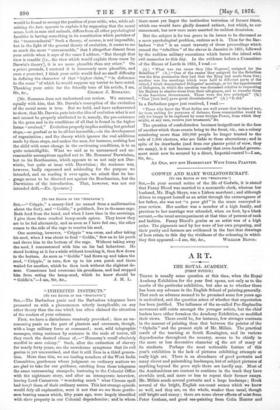"INHERITED INSTINCTS."
[TO THE EDITOR OF THE SPECTATOR."]
Srn„—The Barbadoes panic and the Barbadoes telegrams have presented us with a phenomenon utterly inexplicable, on any other theory than the one which has often claimed the attention of the readers of your columns.
First, we have a disturbance wantonly provoked ; then an un- reasoning panic on the part of planters and overseers, though, with a huge military force at command ; next, wild telegraphic messages, rising sentence by sentence in the scale of terror, till they reach the desired climax of,—" Hennessy's recall absolutely needful to save colony." Such, after the extinction of slavery for nearly forty years, are the unwelcome symptoms that its evil genius is yet unexorcised, and that it still lives in a third genera- tion. More than this, we see leading members of the West India Committee, gentlemen whose judgment on ordinary matters we are glad to take for our guidance, catching from these telegrams the same unreasoning stampede, hastening to the Colonial Office with the nightmare story, and after an intemperate interview, leaving Lord Carnarvon " wondering much " what Circean spell had bereft them of their ordinary senses. This last strange episode would defy all explanation, were it not that we see these gentle- men bearing names which, fifty years ago, were largely identified with slave property in our Colonial dependencies ; and in whom there must yet linger the instinctive terrorism of former times,.
which one would have gladly deemed extinct, but which, to our amazement, has now once more asserted its unblest dominion.
But the subject is far too grave in its issues to be discussed as a mere psychological problem, curious as it is. Thus far the Bar- badoes " riot " is an exact travesty of those proceedings which caused the "rebellion" of the slaves in Jamaica in 1831, followed
by the ruthless military executions which haunt the island with evil memories to this day. In the evidence before a Committee of the House of Lords in 1832, I read:— (Q.) " What was the cause they [the Negroes] assigned for the Rebellion ?" (A.) "One of the causes they assigned for the Rebellion was the firm persuasion they had that the King had made them free; another was the meetings which were held in different parts of the island, I think denominated Delegates' meetings, or for the-appointment of Delegates, in which the question was discussed relative to requesting his Majesty to absolve them from their allegiance, and to transfer them to the American Government. Those were the two principal." (Q.), "That [that last] gave great dissatisfaction?" (A.) "It did."
In a Barbadoes paper just received, I read :— "Those who know the West Indies are well aware that in time of war, far from uniting for purposes of defence, these communities would be: only too happy to be captured by some foreign Power, from which they might, at any rate, receive just treatment," &c.
The question of confederation becomes insignificant in the face of another which these events bring to the front, viz., can a colony numbering more than 160,000 people be longer trusted to the- rule of 1,300 electors, who are liable to these aberrations; and in spite of its drawbacks (and from our planter point of view, they are many), is it not become a necessity that even-handed govern- ment must now be secured by a direct, Imperial control ?—I sin,. Sir, &c.,
AN OLD, BUT NOT HEREDITARY WEST INDIA PLANTER.


































 Previous page
Previous page